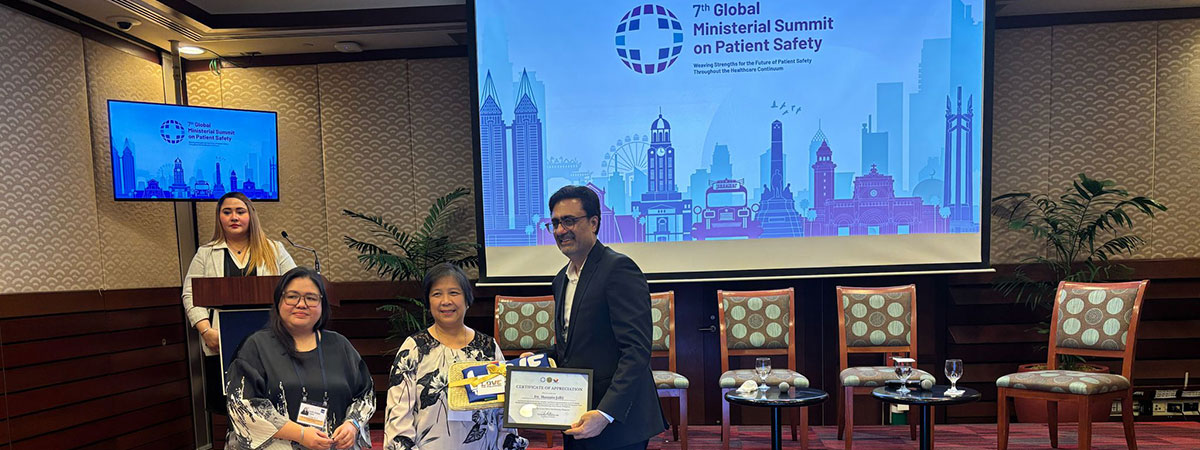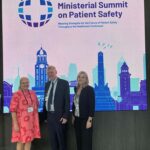Strengthening Patient Safety in a Changing Climate: Insights from the 7th Global Ministerial Summit
The 7th Global Ministerial Summit on Patient Safety, hosted by the Government of the Republic of the Philippines in partnership with the Asian Development Bank (ADB), took place from April 3-4, 2025, in Manila. Under the theme “Weaving Strengths for the Future of Patient Safety Throughout the Healthcare Continuum," the summit brought together health ministers, patient safety experts, and key stakeholders, including patients, to address emerging challenges and share best practices for improving global healthcare systems.
Key discussions focused on implementing the Global Patient Safety Action Plan 2021-2030, fostering a culture of safety, and enhancing patient engagement in addressing social determinants of health. The summit also examined the impact of climate change on patient outcomes, the role of AI and technology in healthcare safety, and the need for sustainable investments. Additional topics included promoting psychologically safe workplaces, strengthening patient-centered care, and advancing global collaboration to eliminate avoidable harm in healthcare.
Representing the World Patients Alliance (WPA), CEO Hussain Jafri and Founding Director Jolanta Bilinska participated in the summit. Hussain served as a panelist in the session on “Synergistic Partnerships in Mitigating the Effects of Climate Change on Patient Outcomes," where he emphasized the essential role of patients and patient organizations in climate action and sustainability. He highlighted how climate change exacerbates health risks, such as respiratory issues from air pollution and heat-related complications for chronic disease patients. Patient organizations are vital in raising awareness through educational initiatives like webinars and campaigns, advocating for stronger environmental policies, and promoting sustainable healthcare practices.
Beyond advocacy, patient organizations support sustainability through community initiatives such as tree planting, clean-up drives, and bike-sharing programs near hospitals. They also encourage the adoption of eco-friendly habits, including proper medical waste disposal, plant-based diets, and energy-efficient practices. Innovations like low-emission inhalers, biodegradable medical devices, and expanded telemedicine services further contribute to reducing healthcare's environmental footprint.
Research and collaboration play a crucial role in addressing climate-related health impacts. Patient organizations can support studies on the link between pollution and respiratory diseases, while partnerships with NGOs, healthcare providers, and policymakers can help implement effective sustainability strategies. Hussain underscored that environmental sustainability should be integral to patient care, just as healthcare quality is today. Evidence shows that hospitals with green building certifications report lower infection rates and faster recovery times, reinforcing the link between sustainability and patient outcomes.
Sustainability is also key to patient safety and health equity, as vulnerable populations—including the elderly and chronically ill—are disproportionately affected by environmental hazards. Proper pharmaceutical disposal reduces water contamination and antibiotic resistance risks. Additionally, patients increasingly expect healthcare providers to lead in environmental responsibility. A 2024 survey found that 68% of patients are more likely to trust healthcare facilities that prioritize sustainability. Furthermore, climate-resilient infrastructure—such as solar-powered and flood-resistant hospitals—ensures continuity of care during natural disasters.
The World Patients Alliance strongly advocates for embedding environmental responsibility into healthcare quality. Sustainability should not be seen as an isolated initiative but as a fundamental pillar of patient care. By integrating climate-conscious practices into healthcare systems, the sector can enhance patient safety, promote health equity, and contribute to a healthier planet for future generations.









